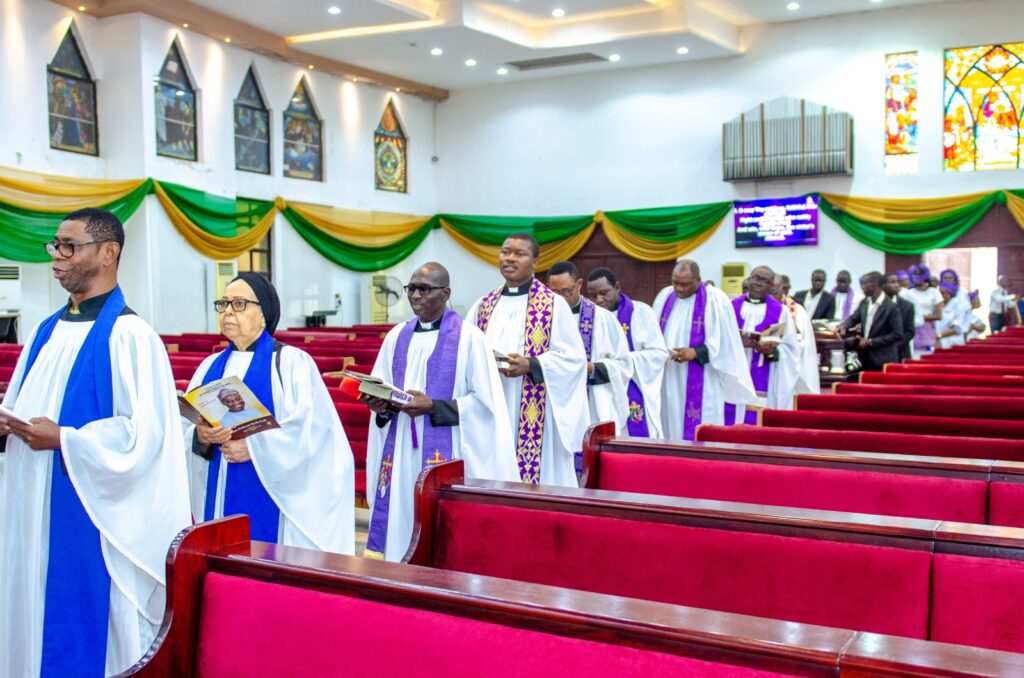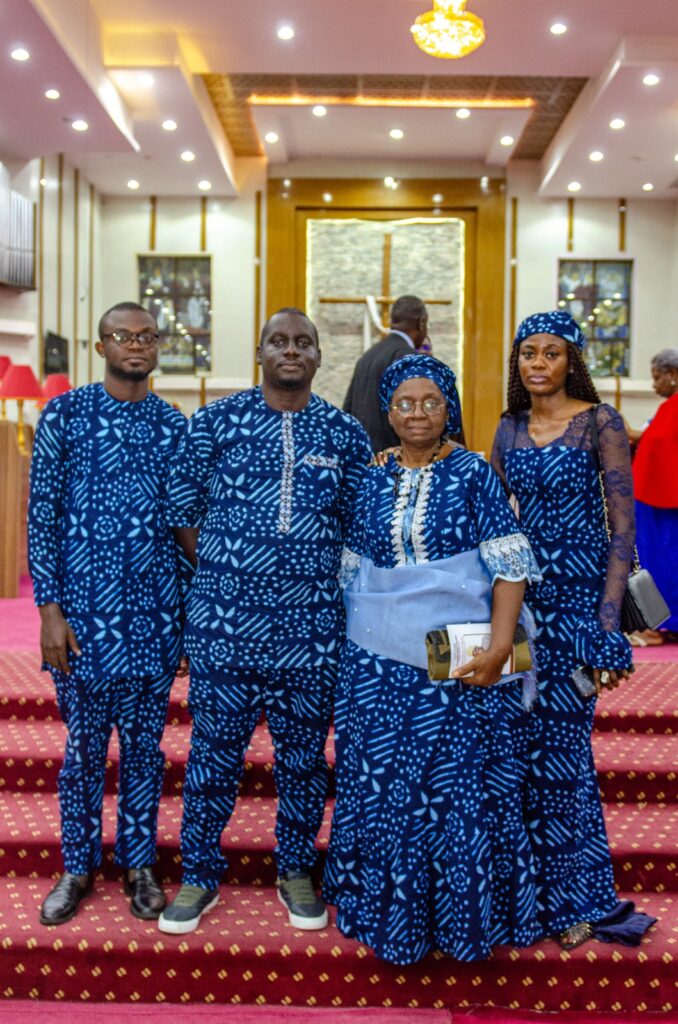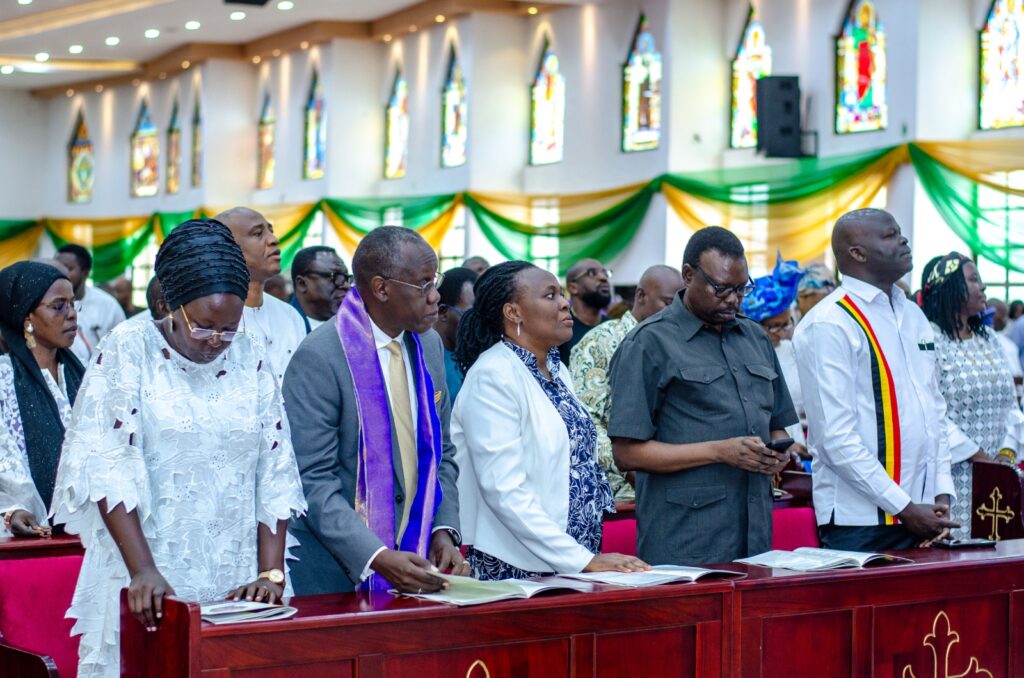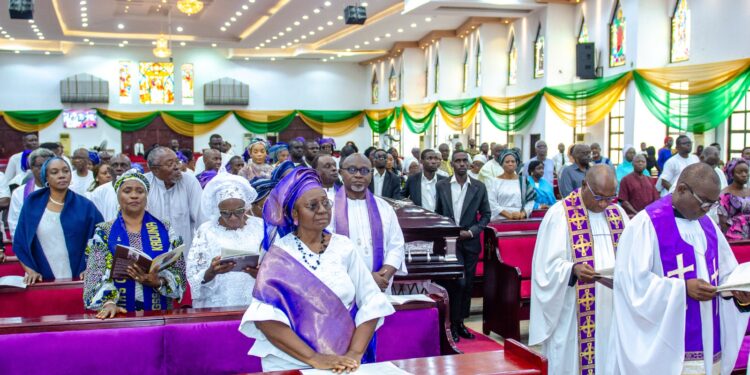A section of Ugandans in Nigeria’s federal capital, Abuja, registered a strong presence to stand with the family of late Prof Okello Oculi at his send-off.
The team was led by Ambassador Philip Odida, the Deputy Head of Mission; minister counsellor Dr Sam Omara; Defence advisor Col Christopher Ogume, and several other staff from the Uganda High Commission. They were joined by Lira University vice chancellor in charge of academics, Prof Opio Okaka Dokotum.
Others included Amolatar District Woman MP Dr Agnes Atim Apea; Ugandan-born Dr Juliet Essene, the Special Advisor on health to Senator Ireti Heebah Kingibe of the Federal Capital Territory of Abuja, Nigeria; and Thomas Awio of the Africa Rice Centre, Abuja. Dr Atim Apea was in Abuja for a water conference and teamed up with her compatriots to bid farewell to Prof Oculi.
Except for Prof Okaka Dokotum, a six-man home entourage to pay last respects to Ugandan-born political science professor and literary giant, did not make it even as the Ugandan High Commission in Abuja had dispatched a note verbale to the Nigerian Foreign Affairs ministry to ease their travel requirements.
Prof Oculi, who passed on July 26, was laid to rest at Gudu Cemetery in Abuja, Nigeria, on August 21.

He had lived 48 of his 82 years in Nigeria where he distinguished himself as a leading Nigerian political scientist and a remarkable Pan-Africanist.
Prof Oculi became better known for his unparalleled intellectual exploits in Nigeria than in his homeland, Uganda. But as Henry Nickson Ogwal, writes: “From his formative years, Oculi imbibed the rhythms, tales, and wisdom of his Lango people, carrying them with pride as he journeyed through his education …”
Ahmed Aminu Ramatu Yusuf, a former student, describes Prof Oculi as an erudite mind who blended African philosophy, history, culture, its politics, and literature, and strategic thinking. He says Prof Oculi championed African unity, democracy, and development and taught ingenious ways of uniquely harnessing European imperialist designs to Africa’s advantage.
Prof Oculi was to be mentioned in the same breath as African intellectual luminaries as Okot p’Bitek, Ngugi wa Thiong’o, and Ali al-Mazrui. He believed in, as Ogwal Nywalowok states, “reasserting the dignity and vitality of African traditions. He believed firmly in the power of culture as unifying force – a foundation upon which the continent’s future must be built’”
Prof Oculi had fled Uganda under the cloud of killings during the brutal military dictatorship of Idi Amin. He was not able to return home, partly for the turbulence at home through the years. But he remains one of the most prolific authors Uganda has produced, with a large collection of literary and polemic works. To his name are titles that include Orphan (1968), Prostit
To celebrate this remarkable life of a distinguished scholar, prolific poet, novelist, and pan-Africanist, a rich and complex mix of academics from the literary, media, history, and political science, as well as students whose lives Prof Oculi had touched, gathered in force to say adieu.
At the service at The Cathedral of the Church of Advent, Prof Okaka Dokotum, himself a poet, playwright, and film scholar, intoned an elegy, Song for the son we lost. A Nigerian publication, Intervention, reported that Prof Oculi’s academic colleagues at Ahmadu Bello University, Zaria, broke down during the session of tributes and shared memories.

Among the faces were professors I.E.S. Amdi, Dr Edwin Bako, and Jerry Gana, also a former Nigerian minister of the Federal Republic of Nigeria.
Prof Oculi, who exhibited unparalleled intellectual exploits in both literary and scholarly work, was also hailed as a teacher of teachers and a mentor of mentors.
Perhaps, as Adabo Onoja wrote in an article in Intervention, Prof Oculi was the “quintessential spokesperson” for the restoration of the African continent, for whom there were no barriers of ethnic, religious, class, national, and generational and gender walls. He was a committed global pan-African citizen with unparalleled scale, and it was only fitting that he should be interred in Abuja, the black capital of the world.
In honour of Prof Oculi, Nigerians have lined up a series of activities, including a commemorative publication, while Prof Okaka Dokotum and Prof Emman Usman Shehu are editing a joint short story collection from Uganda and Nigeria.
But who will aloft lift and move forward the African revival torch that Prof Okello Oculi, Chinua Achebe, Okot p’Bitek, Ali al-Mazrui, and Ngugi wa Thiongo so proudly proclaimed?

About Prof Okello Oculi
- · Born on 11.09.1942 in Dokolo North County, Northern Uganda.
- · He died in Abuja, Nigeria, on 26.07.2025.
- · He was laid to rest at the Gudu Cemetery in Abuja, Nigeria.
- · Her leaves behind his wife, Debrah, children Sembene, Sophie, and Bashir
- · He was educated at Soroti College; St Peter’s College, Tororo; and St Mary’s College, Kisubi.
- · Awarded BA in Political Science, Makerere University, 1967.
- · Undertook student exchange programme at Stanford University, USA, in 1964-1965.
- · Attained MSc in Arts, Essex University, UK, in 1968
- · Awarded Rockefeller Foundation Scholarship for PhD in Political Science, University of Wisconsin, USA.
- · Moved to the Department of Political Science, Ahmadu Bello University, Zaria, 1977.
- · Credited with the Mock-OAU/AU Summit which simulated the OAU/ AU process.
- · He later moved to the Nigerian federal capital city, Abuja, as private political and social consultant.
- · Member, Daily Trust Editorial Board
- · Celebrated for numerous essays, many of them groundbreaking.
- · He leaves an ineradicable mark on the African intellectual, literary, and political spheres.
- · By the time of his death, he was working on a book project on Diallo Telli, the OAU’s first Secretary General.












